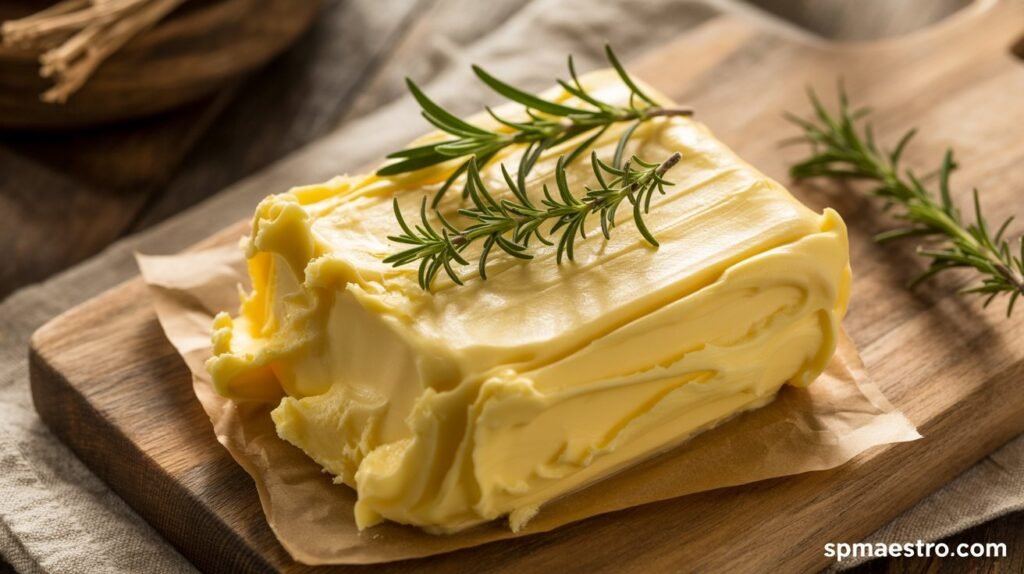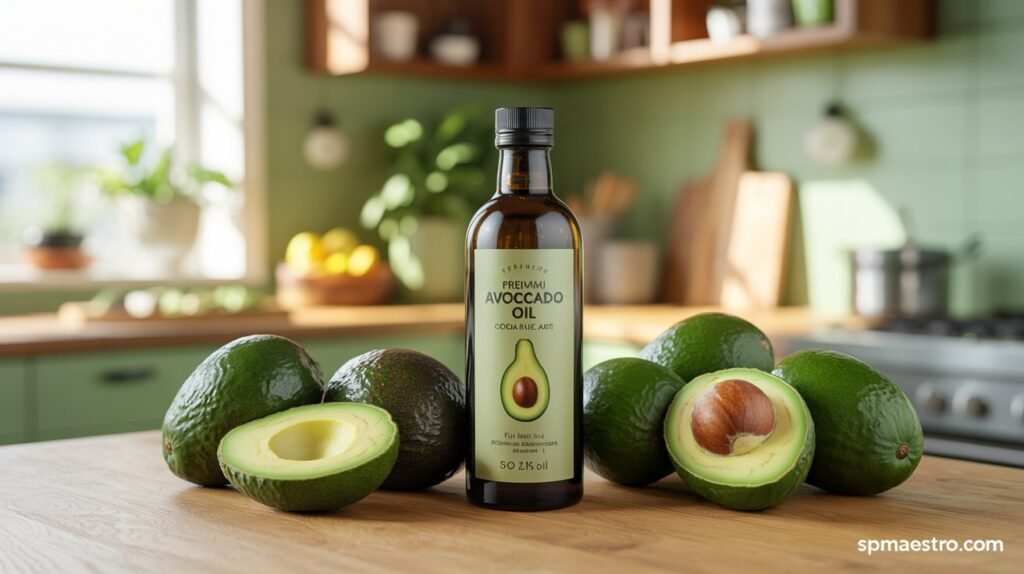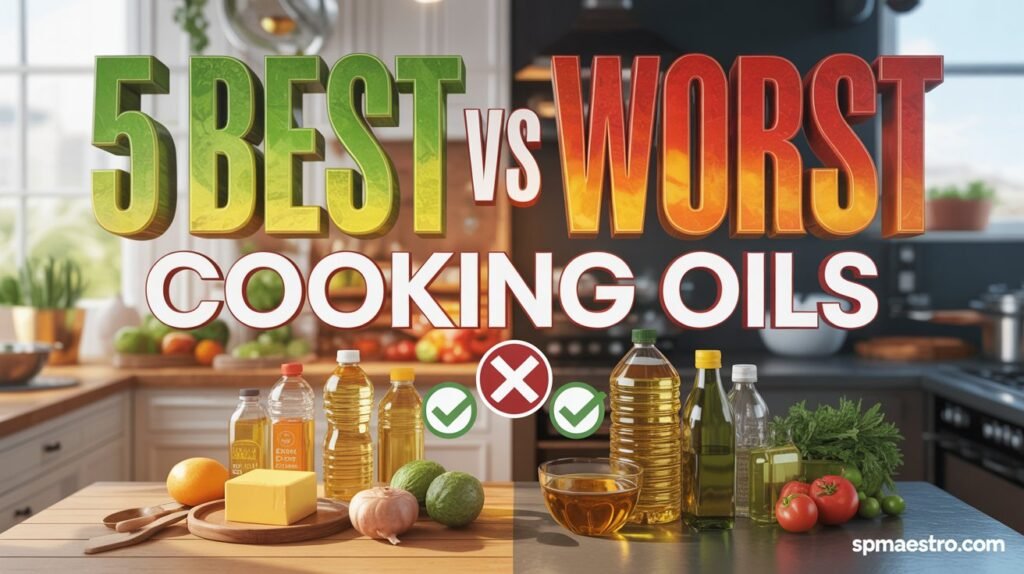Introduction
In recent years, cooking oils have come under scrutiny as we have become increasingly aware of the effects that fats have on our health. With so many options available—from traditional fats like butter to modern alternatives like plant-based oils—understanding which healthy cooking oils are beneficial and which should be avoided is crucial for maintaining a healthy diet. This article aims to provide an extensive overview of various healthy cooking oils, breaking down both the oils that can enhance your meals and those that might pose health risks. By the end of this article, readers will have a comprehensive understanding of healthy cooking oils, enabling informed choices in the kitchen.
Cook Your Food With
Butter

Butter is one of the oldest and most traditional cooking fats, cherished for its rich flavor and creamy texture. It is made by churning cream, resulting in a product that contains about 80% fat and a variety of nutrients. One of the key benefits of butter is its high content of vitamins, particularly fat-soluble vitamins like A, D, E, and K. These vitamins play crucial roles in various bodily functions, from supporting vision and immune health to protecting against oxidative stress.
In addition to its nutritious profile, butter contains butyric acid, a short-chain fatty acid that has been linked to numerous health benefits, including improved gut health and anti-inflammatory properties. When used in moderation, butter can be a wholesome addition to a balanced diet, especially when sourced from grass-fed cows, which tend to have higher levels of omega-3 fatty acids and conjugated linoleic acid (CLA).
Ghee
When choosing healthy cooking oils, it’s important to consider their nutritional profiles and how they can fit into your overall diet. Healthy cooking oils can vary in flavor, smoke point, and health benefits, making it essential to select the right oil for your specific cooking needs.
Ghee, or clarified butter, is a staple in Indian cooking and has gained popularity globally due to its distinct flavor and health benefits. It is made by simmering butter to remove the milk solids and water, resulting in a concentrated fat that is suitable for high-heat cooking. One of the standout features of ghee is its high smoke point, around 485°F (250°C), making it an excellent choice for frying and sautéing without the risk of burning.
Beyond its cooking properties, ghee is rich in fat-soluble vitamins and healthy fats, including butyrate, which supports gut health and has anti-inflammatory effects. Additionally, ghee is lactose-free, making it a suitable option for those with dairy sensitivities. Incorporating ghee into your cooking can enhance the flavor of dishes while providing nutritional benefits.
Avocado Oil

Avocado oil delivers exceptional stability and impressive heat tolerance, making it perfect for high-temperature cooking. This emerald treasure contains heart-healthy monounsaturated fats that support cardiovascular wellness.
Rich in vitamin E and antioxidants, avocado oil protects your cells from oxidative damage while providing a mild, buttery flavor. Its versatility makes it ideal for everything from sautéing to salad dressings.
Coconut Oil
Coconut oil has soared in popularity due to its unique composition and potential health benefits. Composed primarily of medium-chain triglycerides (MCTs), coconut oil is metabolized differently than other fats, providing a quick source of energy. It is often lauded for its ability to boost metabolism and support weight management, making it a preferred choice for those following ketogenic diets.
Additionally, coconut oil has antimicrobial properties, attributed to lauric acid, which can help combat harmful bacteria, viruses, and fungi. While coconut oil is suitable for various cooking methods due to its relatively high smoke point, it is essential to consume it in moderation, as its high saturated fat content may not be ideal for everyone, especially those with heart health concerns.
Virgin Olive Oil
Virgin olive oil is renowned for its health benefits and is a central component of the Mediterranean diet. This oil is extracted from olives without the use of heat or chemicals, preserving its natural antioxidants and polyphenols. Olive oil is particularly high in oleic acid, a monounsaturated fat that has been linked to numerous health benefits, including reduced risk of heart disease and lower inflammation levels.
Moreover, the antioxidants found in virgin olive oil, such as vitamin E and polyphenols, help combat oxidative stress and may protect against chronic diseases. The oil’s rich flavor enhances a variety of dishes, making it suitable for salad dressings, drizzling over roasted vegetables, or even light sautéing. Regular consumption of virgin olive oil has been associated with longevity and improved cardiovascular health.
Different healthy cooking oils can complement a variety of recipes, making it easier to achieve a balanced diet. Understanding the distinct characteristics of healthy cooking oils can guide your choices in the kitchen.
Do Not Cook Your Food With
Sunflower Oil
Sunflower oil is commonly used for frying and baking due to its mild flavor and high smoke point. However, it is essential to be cautious with this oil, particularly the refined versions, which are high in omega-6 fatty acids. While omega-6 fatty acids are necessary for health, excessive consumption, especially in relation to omega-3 intake, can lead to increased inflammation in the body, contributing to chronic health issues such as heart disease and arthritis.
Moreover, the refining process often involves the use of heat and chemicals, which can lead to the formation of harmful compounds. Therefore, while sunflower oil may seem like a convenient cooking option, it is advisable to limit its use in favor of healthier alternatives that are less inflammatory and more nutrient-dense.
Canola Oil

Canola oil is often marketed as a heart-healthy option due to its low saturated fat content and high levels of omega-3 fatty acids. However, much of the canola oil available today is highly processed and may undergo hydrogenation, leading to the creation of trans fats—compounds linked to various health issues, including cardiovascular disease. Additionally, the high omega-6 fatty acid content of canola oil can contribute to an imbalance in the body’s fatty acid ratio, promoting inflammation.
Furthermore, canola oil is often derived from genetically modified organisms (GMOs), raising concerns for those looking to avoid such products. It is crucial to consider alternative oils that provide healthier fats and better nutritional profiles, as relying on canola oil may inadvertently lead to adverse health effects over time.
Grapeseed Oil
Grapeseed oil is often praised for its light flavor and high smoke point, making it a popular choice for frying and baking. However, it is primarily composed of polyunsaturated fats, particularly omega-6 fatty acids. While these fats are necessary for health, excessive consumption can lead to inflammation and various health issues, including cardiovascular diseases.
Furthermore, grapeseed oil can be prone to oxidation when heated, releasing free radicals that can damage cells and contribute to chronic diseases. Therefore, using grapeseed oil as a primary cooking fat may not be the best choice for those seeking to maintain optimal health. Instead, consider using oils with more balanced fatty acid profiles and higher antioxidant content.
Plant-Based Butter
Plant-based butter alternatives have emerged as popular choices for those seeking dairy-free options. However, many of these products contain hydrogenated oils, which can lead to the formation of trans fats. Trans fats are known to increase levels of bad cholesterol (LDL) while decreasing levels of good cholesterol (HDL), raising the risk of heart disease and other chronic conditions.
As you embark on your journey to discover healthy cooking oils, remember that variety is key. Experimenting with different healthy cooking oils can keep your meals exciting and nutritious.
The importance of healthy cooking oils cannot be overstated. By making informed choices about the healthy cooking oils you use, you can enhance your health and culinary skills.
Ultimately, the goal is to select healthy cooking oils that promote a balanced diet. Incorporating a variety of healthy cooking oils can provide essential nutrients and improve your overall health.
Additionally, many plant-based butters are heavily processed and may contain additives and preservatives that can detract from their nutritional value. When looking for alternatives to traditional butter, it is essential to read ingredient labels carefully and opt for products that are minimally processed and free from harmful trans fats.
Corn Oil
Corn oil is another commonly used cooking fat, frequently found in processed foods and commercial frying. While it is low in saturated fat, its high omega-6 fatty acid content can promote chronic inflammation when consumed in excess. The typical Western diet already provides an abundance of omega-6 fatty acids, which can lead to an imbalance in the omega-6 to omega-3 ratio, influencing overall health negatively.
Moreover, corn oil is often derived from genetically modified corn, raising further concerns for health-conscious consumers. To maintain a balanced diet and reduce inflammation, it’s advisable to limit the use of corn oil and seek healthier cooking oils that offer better nutritional profiles.
Conclusion
Choosing the right cooking oils is essential for maintaining a healthy diet and overall well-being. While oils like butter, ghee, tallow, coconut oil, and virgin olive oil provide various health benefits and contribute to a balanced lifestyle, others like sunflower oil, canola oil, grapeseed oil, plant-based butter, and corn oil may pose risks when consumed excessively. Understanding the nutritional profiles and cooking properties of these oils can help individuals make informed choices in the kitchen.
Incorporating healthier fats into meals can enhance flavor and support long-term health. By prioritizing nutrient-dense oils and minimizing the intake of highly processed and inflammatory fats, individuals can enjoy delicious meals that nourish the body and promote overall health.
FAQs
What is the healthiest cooking oil?
The healthiest cooking oil often depends on the cooking method and individual dietary needs. However, extra virgin olive oil is widely regarded as one of the healthiest options due to its high levels of monounsaturated fats and antioxidants.
Can you use coconut oil for frying?
Yes, coconut oil can be used for frying due to its relatively high smoke point. Its unique composition of medium-chain triglycerides also provides potential health benefits.
Are all plant-based oils unhealthy?
No, not all plant-based oils are unhealthy. Oils like olive oil and avocado oil are considered healthy options, while others, like corn oil and canola oil, may have drawbacks. It’s important to choose minimally processed oils.
Is butter healthy in moderation?
Yes, butter can be healthy in moderation, especially when sourced from grass-fed cows. It contains beneficial nutrients and healthy fats, but should be consumed as part of a balanced diet.
What oils should I avoid for frying?
Avoid oils high in omega-6 fatty acids and those that are heavily processed, such as sunflower oil and grapeseed oil, as they can lead to inflammation and health issues when used frequently in frying.
Here are some other captivating pieces of content that you may find interesting.
His Holiness Beloved SP Maestro Invited as Special Guest for Hanuman Chalisa Meditation in London
A Sacred Evening of Spiritual Awakening at Siddhashram Dham London is set to witness a…
1600+ Days of Continuous Yagnas and Counting: An Ongoing Mission for Global Harmony
One of the Longest Continuous Yagna Rituals in Modern History An Unprecedented Spiritual EndeavorIn an…
Journey of His Holiness SP Maestro Mahaaguru Ji
25 years of inspiring journey of His Holiness Beloved SP Maestro Mahaaguru ji HIS HOLINESS…
Free Medical Camp Serves 150 Residents in Ramalakshmana Pally
Mancherial, November 24 – AEMSS Foundation, with the blessings of beloved SP Maestro, successfully organized…
What Are Mudras? 7 Sacred Hand Positions That Powerfully Transform Your Well-Being
What Are Mudras? Understanding These Sacred Hand Positions Have you ever wondered what those graceful…
7 Rules for Charisma: Proven Secrets to Become Magnetic in Any Room
Explore Inspiring Spiritual Websites
Explore Inspiring Spiritual Websites
Aumaujaya.org
A spiritual website filled with inspiring content to help you deepen your understanding of mindfulness and living in the present. Explore their teachings to enrich your journey toward inner peace.
Visit Website →Auysa.org
A platform dedicated to motivating and uplifting the spirit of youth. If you’re looking for ways to inspire younger generations to embrace the present, this is a fantastic resource.
Visit Website →Shreeprabhu.org
A spiritual website with inspiring content centered around the idea of “Universal Oneness.” Their teachings align beautifully with the art of being present and finding happiness in every moment.
Visit Website →








